Participation in physical activity promotes relaxation and exhausts energy reserves, leading to improved sleep patterns. Regular exercise helps to synchronize the body’s internal clock, contributing to more consistent and restorative sleep.
Engaging in physical activity is a cornerstone of health, with benefits that extend into the realm of sleep. Exercise not only triggers the release of endorphins, which have mood-enhancing properties, but it also contributes to better quality sleep, a crucial factor for overall wellbeing.
It serves as a powerful antidote to stress and anxiety, which are common culprits of sleep disturbances. By elevating the body’s temperature during exercise and allowing it to cool down afterwards, it invites a natural drowsiness that helps in falling asleep quicker. Meanwhile, the stress-busting effects of physical activity ensure a more peaceful, uninterrupted rest. Tailoring a fitness regimen to align with one’s lifestyle can lead to significant improvements in sleep duration and quality, turning ample rest into another attainable benefit of an active lifestyle.

Credit: www.healthline.com
The Link Between Physical Activity And Sleep
Struggling to snooze? Exercise could be the key to better sleep. Engaging in regular physical activity benefits not only your daytime energy levels but also contributes to more restful nights. Let’s explore how moving your body can lead to improved sleep patterns.
Benefits Of Regular Physical Activity
Physical activity is a powerhouse for your health. Here’s why:
- Boosts mood and combats stress
- Enhances heart health
- Fights weight gain and builds strength
- Increases energy levels throughout the day
- Improves overall well-being
Impact Of Physical Activity On Sleep
Sleep better with exercise? Absolutely! Working out can help you:
- Fall asleep faster
- Deepen your sleep cycle
- Minimize night awakenings
- Stabilize your sleep patterns
Studies show people who exercise regularly report better quality sleep and feel more alert in the day.
Mechanisms Explaining The Relationship
Wondering how physical activity works its magic on sleep? It comes down to a few key points:
| Effect | Mechanism |
|---|---|
| Body Temperature | Exercise raises body temperature; a post-exercise drop promotes sleep. |
| Circadian Rhythm | Daytime activity strengthens the body’s natural sleep-wake cycle. |
| Anxiety and Depression | Activity is a known mood booster, lowering stress for restful nights. |
| Physical Tiredness | Engaging muscles during the day can lead to a deeper sleep state. |
Understanding Sleep Patterns
Sleep is as essential to our health as eating, drinking, and breathing. It allows our bodies to repair themselves and our brains to consolidate our memories and process information. Poor sleep is linked to physical problems such as a weakened immune system and mental health problems such as anxiety and depression.
Importance Of Sleep
Good sleep is crucial for optimal health and can affect hormone levels, mood, and weight. Sleep is key to thinking clearly, making decisions, and functioning well. When we skip our rest, we are more prone to accidents, injuries, and errors.
Stages Of Sleep
Sleep cycles through several stages:
- Non-REM (NREM) Sleep: Consists of three phases, progressing from light to deep sleep.
- REM (Rapid Eye Movement) Sleep: When most dreaming occurs, brain waves mimic being awake.
These stages repeat several times during a good night’s rest, helping to restore the body and mind.
Factors Affecting Sleep Patterns
Many factors can disrupt our sleep patterns:
- Lifestyle choices such as irregular sleep schedules or screen time before bed.
- Stress and anxiety which can lead to insomnia.
- Physical activity can greatly enhance both the quality and duration of sleep.
Regular physical activity has been shown to help us fall asleep faster and deepen our sleep. When we exercise, our body temperature rises during the activity and then drops afterward. This drop can make us feel more relaxed and sleepy. Exercise can also reduce stress and alleviate anxiety, leading to better sleep quality.
How Physical Activity Promotes Better Sleep
Staying active does more than just keep a body fit—it helps it sleep better too. Consistent physical activity can lead to significant improvements in sleep quality, duration, and ease of falling asleep. Understanding the science behind this can inspire regular exercise for improved night-time rest.
Regulating Circadian Rhythms
Regular physical activity plays a key role in synchronizing our internal clocks, or circadian rhythms. Engaging in activity, especially in natural light during the day, signals the body that it’s time to be alert and active. This, in turn, reinforces the natural cycle of our sleep-wake patterns, helping us wind down effortlessly as night approaches.
- Exposure to daylight during exercise enhances circadian regulation.
- Evening exercise, while stimulating, should be avoided too close to bedtime.
Reducing Anxiety And Stress
Anxiety and stress are common culprits behind sleep disturbances. Physical activity serves as a natural anxiety reducer, thanks to the endorphins released during exercise. These “feel-good” hormones elevate mood and bring a sense of calm, preparing the mind for restful sleep.
- Exercise facilitates a decline in stress hormones like cortisol.
- It also improves our ability to cope with day-to-day stressors.
Promoting Body Temperature Regulation
Exercising increases body temperature, and the post-exercise drop in temperature can help promote feeling sleepy. The decline mimics the natural drop in body temperature that occurs before sleep, signaling the body it’s time for rest.
| Time of Exercise | Body Temperature Impact |
|---|---|
| Morning/Afternoon | Leads to a natural decline later in the day |
| Evening | Should cool down before bedtime for optimal sleep conditions |
Finding The Right Balance
Good sleep comes with balance. A lifestyle that blends physical activity and restful nights could open the door to remarkable health benefits. When you exercise the right amount at the right time, sleep often follows suit, whisking you into a deep, restorative slumber. This tidy trio—duration, type, and timing—can harmonize your sleep patterns. Striking the perfect balance isn’t magic but a matter of informed choices.
Recommended Amount Of Physical Activity
Experts suggest adults need at least 150 minutes of moderate exercise or 75 minutes of vigorous activity each week. For even greater benefits, doubling these numbers can further boost health. Here’s the key: it doesn’t need to be intense to count. Moderate walks or leisurely bike rides can do the trick. Stay consistent, and watch your nighttime rest improve.
Choosing The Right Type Of Activity
- Aerobic Activities: Brisk walking, swimming, or cycling keep the heart rate up.
- Strength Training: Lifting weights or bodyweight exercises for muscle health.
- Balance and Flexibility: Yoga or Pilates to reduce stress and soothe the body.
Select activities that feel good to you. Enjoyment leads to consistency, and consistency fosters better sleep.
Timing Of Physical Activity For Optimal Sleep
Timing of exercise greatly affects sleep quality. You can try morning workouts to jumpstart your day. This can enhance your energy levels. Working out in the late afternoon or early evening can help you wind down. Aim to avoid vigorous exercise less than three hours before bedtime. It can be too stimulating and disrupt your sleep.
Additional Tips For Quality Sleep
After exploring how physical activity enhances sleep, let’s dive into extra steps for restorative slumber. These proven strategies complement exercise for even better nights.
Creating A Sleep-friendly Environment
A tranquil bedroom is a sleep sanctuary. To create this, focus on dim lights, pleasing aromas, and serene colors. Your mattress plays a major role, too – ensure it provides ample support and comfort.
- Maintain a cool temperature around 60-67 degrees Fahrenheit.
- Keep the room dark using blackout curtains or a sleep mask.
- Reduce noise levels, or use white noise machines to mask disruptions.
Establishing A Bedtime Routine
Consistency is key for your body’s internal clock. Set a regular time to wind down each night. This signal helps your body prepare for sleep.
- Choose a set bedtime and wake-up time, even on weekends.
- Engage in a relaxing activity, like reading or a warm bath.
- Avoid heavy meals, caffeine, and screens an hour before sleep.
Managing Sleep Disorders
If falling or staying asleep is consistently challenging, a sleep disorder may be present. Consult a healthcare professional to address issues such as insomnia or sleep apnea.
- Practice good sleep hygiene, following a regular sleep schedule.
- Limit naps, especially long or late-afternoon ones.
- If prescribed, use CPAP machines or other treatments as directed.

Credit: www.heart.org

Credit: www.hopkinsmedicine.org
Frequently Asked Questions For How Can Participation In Physical Activity Lead To Improved Sleep Patterns?
Does Physical Activity Improve Sleep Patterns?
Yes, engaging in regular physical activity can lead to improved sleep patterns by promoting relaxation and supporting a healthy circadian rhythm.
How Can Participation In Physical Activity Lead To Improved Sleep Patterns Brainly?
Regular physical activity promotes better sleep by reducing stress and helping to regulate your internal circadian rhythm.
How Can Participation In Physical Activity Lead To Improve?
Participation in physical activity enhances sleep by reducing stress, regulating circadian rhythms, and promoting physical tiredness.
How Does Exercise Improve Mood And Sleep?
Exercise releases endorphins and serotonin, boosting mood and promoting relaxation, leading to better sleep quality.
Conclusion
Embracing regular physical activity has proven to be a key factor for advancing sleep quality. By participating in exercise, one experiences the dual benefits of stress reduction and energy optimization, easing the transition to restful slumber. Adopting an active lifestyle can be the turning point for those seeking deeper, more restorative sleep.
Embrace this change and unlock the path to better rest, starting tonight.

